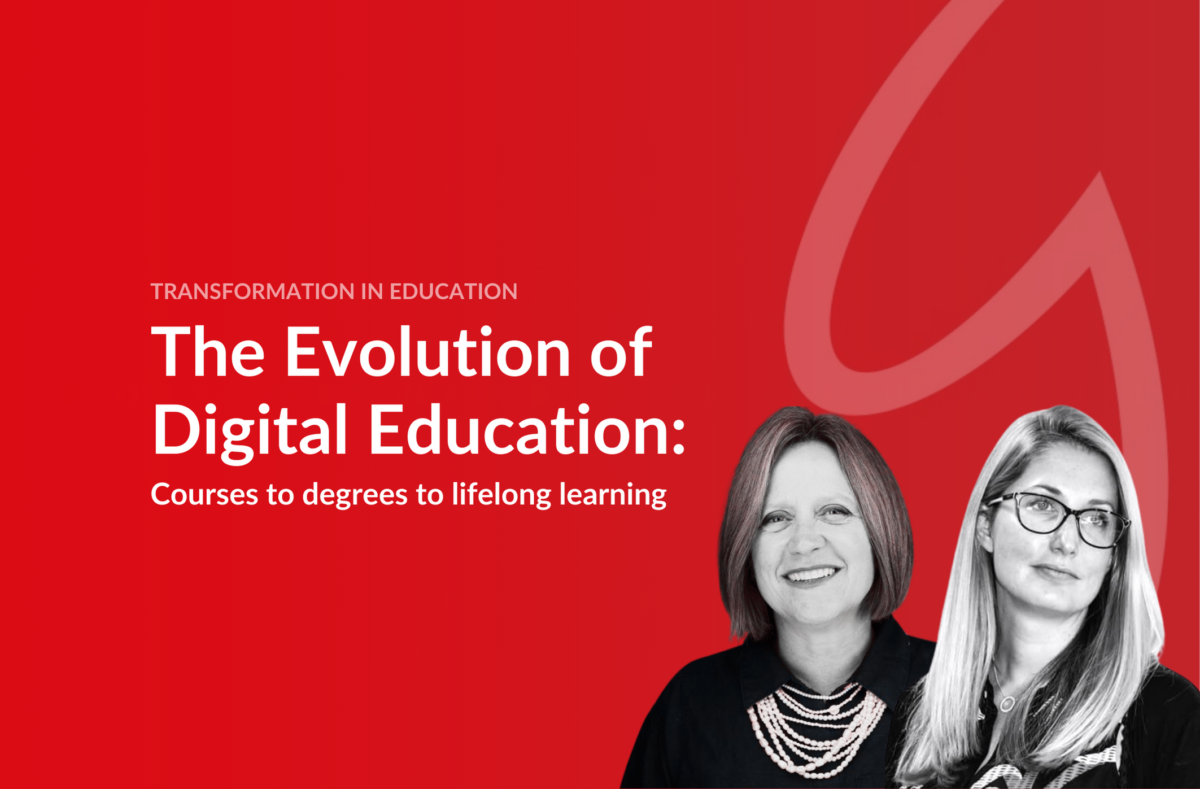The Evolution of Digital Education: This article is part one of a five part series looking into transformation in the education sector.
Transformation in Education series – coming soon:
- The Evolution of Digital Education
- How to Maximise the Value of Your OPM Partnerships
- Building Internal and Hybrid Teams to Support a Digital Future
- Hiring Trends and the Future of Digital Leadership in Higher Education
- Using Your Digital Leadership Search to Build Institutional Visibility
Higher education has undergone a dramatic transformation over the past two decades, driven by the rise of digital education. What started as individual online courses has evolved into stackable learning experiences and comprehensive portfolios of online degree programmes. This shift reflects changes in learner behaviour and the growing availability of digital learning materials, both within higher education institutions and from EdTech organisations. These developments have broken down geographical barriers, opening doors to learners across the globe.
But as we review the story of digital education and look to the future, the transformation is far from complete.
From Individual Courses to Online Programmes
In its early days, digital education focused on standalone online courses, designed to complement traditional learning. These courses tested the capabilities of emerging Virtual Learning Environments and gave learners the flexibility to engage with education at their own pace, often while balancing work or personal commitments.
As demand grew, courses transitioned into full degree programmes. Universities realised this shift could expand their reach without requiring new physical infrastructure, broadening access and creating new revenue streams. University administrators leveraged this as a way to navigate the challenges of a competitive and resource-constrained sector.
Moving Beyond Traditional Degrees
Influenced, in part, by the success of the for-profit sector in the US, universities began focusing intently on online degrees. Institutions such as Southern New Hampshire University, ASU Global, and RMIT have demonstrated the potential of large-scale, globally competitive online campuses. However, this focus on degrees—often delivered year-round—has tended to separate online learning from more traditional on-campus experiences. This divide does not fully meet the needs of today’s learners, who value flexibility, customisation, and learning on demand.
Additionally, learning is no longer confined to a single stage in life and learners seek opportunities that support career and personal aspirations. Universities are capitalising on this shift by creating pathways that extend both before and after degree programmes, offering value over the lifetime of a learner’s journey.
A Digital-First Mindset
Universities are starting to respond by adopting a Digital First mindset. This shift focuses on creating flexible, modular, and stackable learning experiences that align with the diverse needs of learners at various stages of their lives. Short courses, microcredentials, and professional certifications are becoming essential components of the education landscape. Standalone learning is also gaining acceptance among learners and employers, providing individuals with the tools to upskill or reskill in a rapidly changing job market. For example, King’s College London’s stackable microcredential approach allows students to study across campuses or online, tailoring their learning to fit their goals.
The Future: Blended, Personalised, and Lifelong
The evolution of digital education is offering learners an array of options delivered by higher education institutions and EdTech providers alike. For universities, the future lies in integration—blending online and on-campus, short and long form, experiences to create seamless, personalised pathways for learners across their lifetime. This approach allows universities to engage a wider audience, from school leavers to mid-career professionals and retirees exploring new interests. A recent report by Risepoint, ‘Voice of the Online Learner’ shows the alignment of thinking about students before, during and after their degree experience. “86% of graduates and currently enrolled students are likely to pursue another online programme in the future to upskill (Voice of the learner, 2024.” This underscores the growing importance of lifelong learning and its alignment with industry needs.
Perhaps the final piece of the puzzle is the growing expectation for personalisation. By leveraging AI and other technologies, universities can personalise learning experiences to align with individual career goals, interests, and circumstances. Imagine a future where learners seamlessly transition between online and on-campus courses, combining Microcredentials, short courses and microlearning with degrees to create a lifelong educational journey.
A Call to Action for Universities
To thrive in this new era, universities must rethink their strategies. This includes reimagining programme design, investing in modern infrastructure, and building leadership teams capable of delivering on digital ambitions. Success will require a focus on offering a contemporary digital experience, supported by professionalised services and a commitment to lifelong learning.
What do you see as the next big step for digital education? How is your institution preparing for this shift?
At GatenbySanderson, we bring extensive experience in identifying and recruiting digital education leaders. By building strategic leadership teams, we help universities adapt and thrive in a rapidly changing environment, ensuring they have the vision and expertise needed to navigate the future of education.
For more information contact:
Alison Elton,
Principal Consultant, Education practice
GatenbySanderson
Authors:
- Alison Elton, Principal Consultant,
GatenbySanderson - K.Holly Shiflett, PhD, Director of Educational Enterprise,
City St George’s, University of London.
